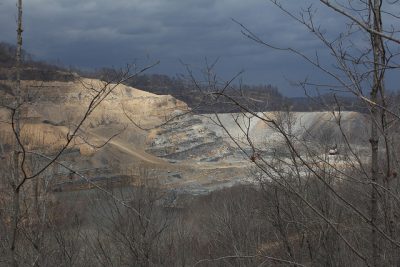Front Porch Blog

“We should never forget who brung us to the dance,” Gov. Jim Justice said of the coal industry during the 2017 State of the State address. Photo via Wikimedia Commons.
Long before Jim Justice became the governor of West Virginia, he was well known across Central Appalachia as a billionaire coal company owner.
Much like President Trump, Justice campaigned not as a politician, but as a savvy businessman who promised to simultaneously clean up politics and revitalize the economy. That message apparently resonated with voters who were either unconcerned with Justice’s total lack of experience in elected office or unwilling to face the realities of the coal industry’s future.
Justice’s early career also bears some resemblance to Trump’s — his family history is modest, but his father became wealthy and Justice was catapulted into business ownership at a young age. Both sides of Justice’s family worked in the coal camps. His father, Jim Sr., worked his way up in the coal mines until he owned his own company, which he sold for several million dollars in the 1970s.
Jim Jr. started out in the family agriculture business and later inherited the family’s coal and corn farming businesses when his father died in 1993. The stated value of those businesses was about $25 million at the time. There is no doubt that Justice is a shrewd businessman. He is West Virginia’s only billionaire, worth an estimated $1.6 billion. Before becoming governor in January, he was the president or CEO of at least 50 companies, including the famed Greenbrier resort in West Virginia. Like Trump, the extent to which Justice has separated himself from his businesses while serving in public office remains unclear.
Despite his business savvy, or perhaps because of it, the motivations behind his political aspirations are difficult to determine. In 2015, Justice switched from the Republican to the Democratic party and announced his bid for West Virginia governor. West Virginia has a long history as a left-leaning state, typically electing Democrats to most state positions and voting for the Democratic presidential candidate until the early 2000s. The state has been turning red in recent years. Justice won the 2016 gubernatorial race, beating the Republican candidate by almost 7 percent. Just seven months later, Justice announced his return to the Republican Party, on stage, at a Trump rally in Huntington, W.Va.
Justice is certainly working to promote Appalachian coal mining. He has pushed Trump to subsidize coal-fired power plants to purchase Appalachian coal at a rate of $15 per ton. His argument for such a move? National security. Exploiting a culture of fear has become a popular tactic for many politicians lately, and Justice has apparently taken note. He argues that the United States has become too reliant on natural gas, which has been out-competing coal on a regular basis for the last few years. “Can you imagine what would happen if we lost the power in the East for a month, or two months, or three months?” Justice asked in a Bloomberg News interview. “It would be like a nuclear blast went off. You would lose hundreds of thousands of people. It would be just absolute chaos beyond belief.”
Many conservatives aren’t buying Justice’s plan. “Like corporate welfare queens everywhere, Justice pitches his plea for taxpayer bailouts in terms of jobs,” the conservative think tank Cato Institute said of the plan. “Yet Governor Justice’s proposal … would simply prolong the dying of an industry that has been declining for years, because West Virginia coal is increasingly expensive and difficult to mine, in the face of national and international competition.”
A troubled history with coal mines
In 2014, NPR published an in-depth report on fines owed by Justice’s mining companies. At the time, the companies owed nearly $2 million in fines and had more than four times the number of overdue fines than the next most-delinquent mine operator. The overdue fines are especially egregious, given Justice’s personal net worth. But even more problematic than the fines were the violations that led to them. Justice’s companies accumulated thousands of safety violations over the period covered in the NPR investigation, including 1,300 classified as likely to cause injury or illness, and more than 500 that are common in mine disasters.
The chief operating officer of Justice-owned Southern Coal, Tom Lusk, defended the company, stating that Southern needed to stand on its own, not be bailed out by Justice himself. Lusk argued that the delinquent fines did not actually jeopardize mine safety. A follow-up investigation in 2016 showed that Justice owed $15 million in taxes and fines across six states, including $1.38 million in new and unpaid mine safety penalties.
Justice companies’ violations cover environmental and administrative issues as well. A&G Coal Corp. has outstanding violations at a minimum of 10 mines in Virginia. The violations involve a wide range of issues, including mine maintenance and planning, and failure to pay fees. Justice mines in Tennessee have accumulated 15 violations across eight mines in the past three years.
Lately, Justice’s companies seem to be going on the offensive to balance their books. Three companies associated with Justice are claiming to have paid excessive taxes in Wise County. A&G Coal, Virginia Fuel Corp. and Nine Mile Mining filed a civil lawsuit alleging overbilling and incorrect tax assessment over the past three years and demanding more than half a million dollars from the county.
The companies allege that the overbilling arose from fees incorrectly assessed for mining machinery that has been idled. The companies have several mines in Southwest Virginia that have been idled since 2013 and 2014. This situation often occurs when the price for coal declines and companies choose to idle a mine until market conditions become more favorable. Given recent market conditions, many mines in Wise County and throughout Central Appalachia have been idled for four years or more, leaving large swaths of mined land barren with neither mining nor reclamation taking place.
Like much of Appalachia, Wise County is facing tough economic times as the area struggles to adapt to losses of coal jobs. The decline in active mining and in total population has dealt a massive blow to the county’s tax coffers. One consequence of this in recent years has been the consolidation of Wise County’s six public high schools into three — a move that has failed to fully mitigate consistent and growing budget shortfalls for the county school board. If Justice truly had Central Appalachia’s future in mind, he might suggest his coal companies pay what they owe, rather than pursue costly litigation against local and state agencies.
Justice’s companies in Kentucky are taking an even more aggressive approach. Kentucky Fuel Corp. is suing two officials from the Kentucky Department of Natural Resources after the agency attempted to collect millions of dollars in unpaid fines. “These lawsuits appear to be an attempt to intimidate public officials from performing their statutory duties to enforce coal mine reclamation laws,” John Mura, spokesperson for the Kentucky Energy and Environment Cabinet, said in a statement emailed to ThinkProgress. “The legal actions are entirely without merit and will be vigorously defended to protect our state government officials who devote their careers to safeguarding the land and the health of Kentucky citizens.”
Jim Justice clearly favors Central Appalachian coal; it’s largely how he made his fortune, so his motives are understandable, even if they’re not laudable. What is less clear is whether Justice is thinking about Central Appalachian people or the future of the region. Regardless of his motivations, his pie-in-the-sky proposal for keeping coal competitive does not make sense. After being mined for more than a century, Central Appalachian coal is scarce and expensive to mine. The region has reached a transition point. Appalachia needs leaders to guide it into a new economy, not politicians invested in only their own wealth and popularity.
PREVIOUS
NEXT
Related News

Leave a comment
Your email address will not be published. Required fields are marked *


Unfortunately, the people of these communities voted the dirty energy politicians in. These are the consequences.